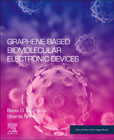
Graphene Based Biomolecular Electronic Devices outlines the fundamental concepts related to graphene and electronics, along with a description of various advanced and budding applications of graphene-based bioelectronics. The book includes coverage of biosensors, energy storage devices such as biofuel cells, stretchable and flexible electronics and 3D printed graphene in bioelectronics. Taking an interdisciplinary approach, it explores the synergy produced due to charge transfer between biomolecules and graphene. This helps the reader understand the promising bioelectronic applications of graphene-based devices. Graphene has promising applications in semiconductor electronics, replacing the use of traditional silicon-based devices due to its semi-metallic nature and tunable energy band gap properties. The tuning of electron transfer with redox properties of biomolecules could potentially lead to the development of miniaturized bioelectronic devices. Thus, graphene, with its unique sensing characteristics, has emerged as an attractive material for the production of biomolecular electronic devices. Explains advanced and emerging techniques for creating graphene-based bioelectronic devices Outlines the fundamental concepts of graphene-based bio-integrated systems Addresses the major challenges in creating graphene-based bioelectronic devices on a mass scale INDICE: 1. Introduction2. Graphene-based Transducers and Sensing Platforms for Biosensors3. Bio-FET based biosensors4. Nucleic Acid-based Biosensors5. Protein-based Biosensors6. Energy Storage Devices 7. 3D Conducting Ink8. Flexible and stretchable electronic devices9. Merging tissue and electronics; Future prospective and challenges10. Commercial prospective of graphene based biomolecular electronic devices and challenges
- ISBN: 978-0-12-821541-8
- Editorial: Elsevier
- Encuadernacion: Rústica
- Páginas: 400
- Fecha Publicación: 01/10/2022
- Nº Volúmenes: 1
- Idioma: Inglés
